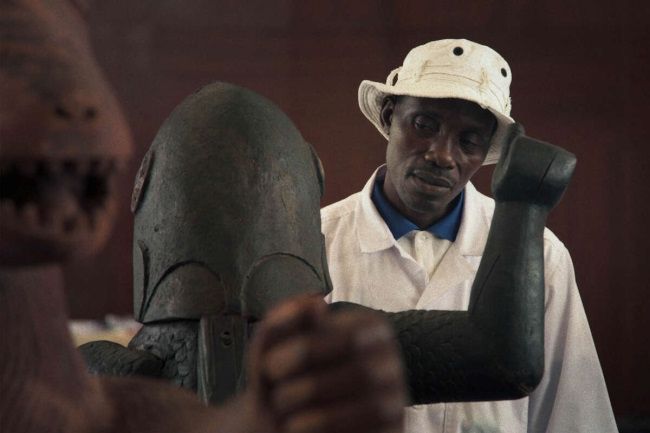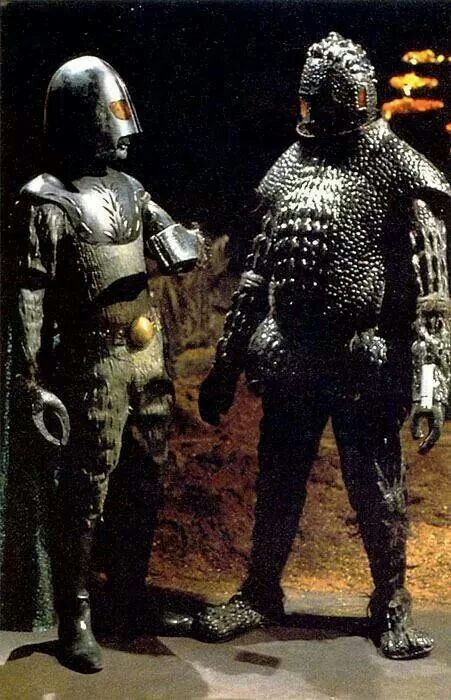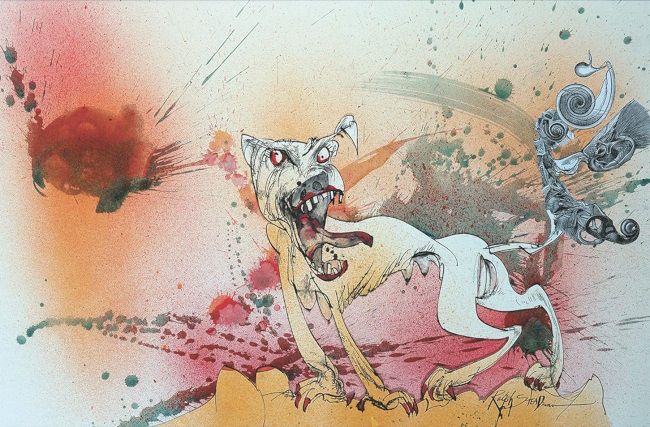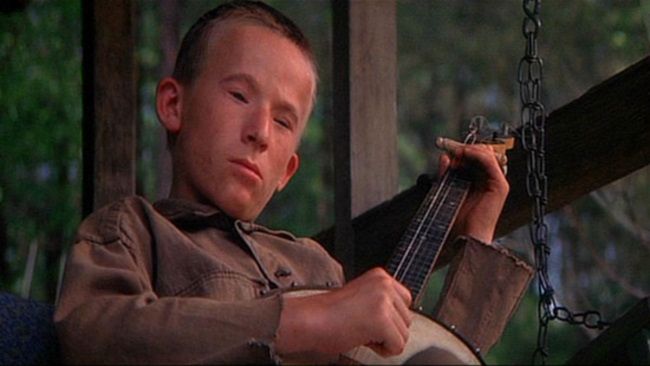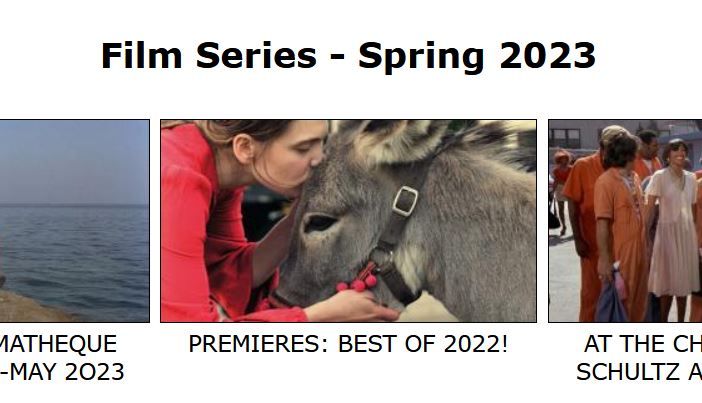Seen before On Becoming a Guinea Fowl. And it's great that this movie made it to a commercial theater here, especially since I missed the screening at Cinematheque. Very affecting.
27 March, 2025
22 November, 2024
Coming Soon: On Becoming A Guinea Fowl
Those of us at UW Cinematheque last night for the screening of Dahomey got a taste of next semester's schedule as they showed a trailer for On Becoming a Guinea Fowl. It's ostensibly a Zambian movie, but it's a co-production with the U.S. & U.K. Looks to be a drama/dark comedy.
21 November, 2024
Slaar? Is it you?
Have you seen the poster for the movie Dahomey? It's a documentary about the repatriation of artwork to Benin from France. And it screens tonight at UW Cinematheque!
Does anyone else see the Ice Warrior commander Slaar from behind?
The helmet, the color, the jaw-like hand.
I look forward to seeing the front of that statue tonight.
25 October, 2024
Fear and Loathing at Cinematheque
I had arrived at 4070 Vilas Hall early and was squirming only slightly in a seat that, while newer than the ones I sat in during the early 90’s when I was a Comm Arts major taking mulitple classes in 4070, was just as cramped and uncomfortable. Patiently waiting for the film to begin, I surveyed my fellow moviegoers who were filing in and I spied some of the usual suspects one sees at Cinematheque. For instance, JoAnne Pow!ers - saxophonist, DJ, and busker extraordinaire - took her customary spot in the front row about 6-8 seats from a fellow who was either former Rainbow Bookstore Cooperative manager/social activist Allen Ruff or his doppelgänger. No doubt the ivy capped Grant Phipps would arrive soon.
The crowd was the expected mix of young & grey-haired cinephiles with a smattering of curious students taking advantage of the opportunity to expand their horizons along with some international ones eager for a little piece of home. All was as it should be.
Then an older woman approached an older man sitting just back and to the right of me. They knew one another and began chatting as people do.
The gentleman admitted to being worried about the election. Nothing out of the ordinary here. I suspect a lot of people are anxious about the election. An admission of anxiety, however, very quickly became an MSNBC program with the woman assuming the role of a geriatric Rachael Maddow.
“Madison will go for Kamala,” Madison’s own Nostradamus reassured her interlocutor who replied that he wasn’t worried about Dane or the counties that surround us nor Milwaukee but rather elsewhere. He offered Grant County as an example of a land populated by heathens before mentioning the bogeymen of many a Madison liberal, people who live “up north”. It was as if the greater Madison area was surrounded by barbarians and war was about to begin in the Teutoburg Forest. The contempt that filled the air was so thick, you could cut it with the wrong side of a knife.
As if on cue, the woman then transformed into the living embodiment of pomposity and arrogance.
“They don’t know how the government works!” she cried in despair. “If you asked any of them, they wouldn’t be able to explain how the Electoral College worked!” Was she in favor of having to pass a literacy test in order to vote like in the Jim Crow South? Or maybe she would just prefer to be ruled over by philospher-kings.
Just as too much emotional distress turns the mild-mannered Bruce Banner into The Hulk, an overabundance of condescension caused this woman to metamorphose into a modern-day Marie Antoinette, completely bereft of any self-awareness or empathy; unable to comprehend how a farmer up north would not bow down to her preeminent understanding of the Electoral College and submit to her superior judgements on all matters political. All that was missing was her uttering, “Let them eat locally-sourced organic vegan cake!”
The man picked up where she left off and blurted out in frustration, “Pointing out his character flaws and what an awful person Trump is doesn’t work.” He then said of up north, “It’s just like Alabama up there.” He noted that he hailed from Fairchild and so his proclamation that folks up north are just a bunch of uneducated, racist, inbred hicks comes on good authority. Deliverance is basically a documentary about rural Eau Claire County, apparently. He proceeded to tell of how he saw some footage online of a black man saying that he liked Trump because the guy told it like it is. In relating this dreadful tale, the man altered his voice to sound like the guy in the video. I didn’t take this as being racist, but rather as simple denigration of a perceived inferior.
Listen to how the uneducated talk!
"Welcome to Hurley!"
Not to be outdone, the woman continued her rant by saying that there are oodles of insecure men who just can’t stand the thought of a woman being president. In addition, there are sexists who just don’t think Harris is up to the task of taking on Vladimir Putin and ending the war in Ukraine.
A second older gentleman entered the fray and soon enough he revealed himself to be, like his two interlocutors, a living embodiment of liberal urban elitism. It was as if this unholy trinity of progressives had watched Tucker Carlson and thought his sterotypes of liberals were actually how-to manuals.
In referring to what I think was people who voted for Obama and then Trump, this second fellow asked exasperatedly, “How fucked up do you have to be?!”
The smugness in this part of the room was getting strong enough to fell a horse. If it was possible to die from self-righteousness, I suspect these people would have spontaneously combusted in their expensive, well-appointed homes or behind the wheels of their electric cars years ago.
Putting on airs of superiority and being a patronizing asshole must be mentally taxing because these self-proclaimed progressives seemed unable to even use a teensy tiny bit of their massive brain power to imagine that someone who doesn’t live in the greater Madison area or Milwaukee (or, as one admitted, smaller cities up north such as Eau Claire or Superior) could look beyond Trump’s character and vote for him because he can get policies they favor enacted. No doubt many religious people were offended by the philandering, the pussy grabbing, the hubris, etc. yet held their noses and voted for the guy anyway thinking he was the best choice to get Roe v. Wade overturned. And Trump delivered.
Not everyone who lives up north is a person of great virtue. Being salt of the earth doesn’t make you a saint. But nor does living far from Madison make you Simon Legree with an 80 IQ. If you go up north, you will find a variety of people including Latinos who make many a dairy farm go, south Asians running hotels, Hmong folks, and, of course, lots of white people. The denizens of up north are generally very nice and many of them are refugees from urban areas. (How many left the cities to get away from arrogant jagoffs like the ones I encountered at the cinema is unknown.)
I have found that rural folks generally like the trees and fresh air, the calm, and the slower pace of life. And they deal with even the worst of us city folk with a pantagruelian cheer. But, if you want to know how the likes of Scott Walker and Glenn Grothman get elected, look no further than the “progressives” I had the misfortune of sitting near last night.
Thankfully none of these people chatting by me got hurt attempting to put themselves in someone else's shoes or by patting themselves on their backs so hard.
Oh, the movie, Only the River Flows, was excellent. Cinematheque is a gem.
02 February, 2024
The Past Is Not Through With Anselm Kiefer
Maybe 10 or 15 minutes in, I thought to myself how much I was enjoying a documentary that was stylistically 180 degrees from Ken Burns. Rather than hearing an omniscient narrator telling me things about German artist Anselm Kiefer, I was seeing his sculpture and paintings in glorious 3D and watching as he goes about his day in his studio.
I'd never heard of Kiefer but I think Wim Wenders does him justice here with a look at his art, which seems to come in one size only - large scale. Themes of German history and the Holocaust are prominent and inspiration comes from the poems of Paul Celan, another artist whom I'd never heard of until seeing this movie.
Anselm is a mix of styles. In some scenes, we see Kiefer at work in his outsized studio which is in a former brick factory. All that space is needed to create his pieces which are usually rather large. Does the size confront the viewer? Or is it meant to make the viewer feel dwarfed or, perhaps, overwhelmed? In others, the camera examines some of his art installations. At first we see them from afar, in toto, the voyeuristic camera hovering just outside their confines. It then gracefully moves into the installation and through them, stopping briefly to let us see the individual statues before moving onto the next one.
There are also reenactments showing us Kiefer as a boy and as a younger man as well as staged scenes in the present day, such as those with the artist taking a break and lying down with a volume of Celan's poetry.
But we don't get much straightforward info about the man or his work. There's no sense of working through his career chronologically with various periods where a certain media is used and/or a prominent theme emerges.
Just a wonderful mix of scenes that add up to an intriguing, impressionistic portrait of Anselm Kiefer.
The 3D brought the art to life, gave it an immediacy, and made me wish I'd seen Wenders' Pina, a previous documentary also shot for 3D.
Many thanks to UW Cinematheque for hosting the screening.
10 July, 2023
A giant never found, a murder never solved
Thanks to the fine folks at UW Cinematheque, I got to see Twilight, the 1990 film by Hungarian director György Fehér, last week. Fehér was a consort of fellow Hungarian filmmaker Béla Tarr whom I know by reputation only. Twilight received little, if any, distribution here in the States, upon release so it's had lost classic status amongst cinephiles. But it's been resurrected with a shiny new 4K print and it looks like it got a bluray release as well.
The story concerns a detective who, shortly before retirement, lands the case of a murdered girl out in a rural area. We begin with an aerial shot of seemingly endless forest stretching out to mountains in the distance and this along with the premise of a dead girl brought Twin Peaks to mind but that's where the comparison ends. That the detective, whose name I don't recall ever being mentioned, is near retirement, made me think of Danny Glover's Murtaugh from Lethal Weapon. But that's just free form cinema association in action.
After the arboreal opening, we see two men in the back of a car as it rumbles on its way to the scene of the crime. Lovely black and wide photography has the men's faces shrouded in shadow while the view out the rear window provides light but no clue as to the setting. The detective gets out and into a good soaking rain where he is informed that the body of a girl was found up the hill near a cross. Rather than cut to the car's exterior, the camera remains in the front seat so we get a view of everyone's torso, but no faces nor legs, as seen through the passenger door window.
I have read that cinematographer Miklós Gurbán supervised this 35mm to 4K digital transfer and that details in darker spaces that film could capture were largely lost when going digital. Score one for analog. I wondered if the men's faces in this scene were more visible on film and if something was lost in the 4K realm.
Anyway, this is a fairly long take with a generous amount of time devoted to the car ride itself. We then see the crime scene from afar with a crowd presumably gathered around the girl's body. The detective emerges from the mass of people and ambles towards the camera which is slowly - very slowly being lowered down to meet him at eye level as he passes it.
This opening sequence provides a template for the rest of the film with its long takes, a camera that often moves slowly and gently, and characters that are usually never in a hurry to provide grist for the plot mill, to justify going from scene A to scene B. The detective doesn't say, "Let's go talk to the family" or "I am going to go to the girl's school". Fehér just moves us from one spot to another and leaves it to us to figure out where we've landed and exactly why.
Several scenes stand out such as one early on when the detective approaches what we learn is the home of the dead girl's family. As he creeps closer, we hear a woman's wailing which is hard to distinguish from forced laughter. He hovers outside a window and we peer inside as his partner informs the parents of their daughter's death. The distraught couple grab onto the guy issuing their emotional demands of wanting to see their daughter's body and that the policeman find the killer. It's an emotionally charged scene but one we witness only by an act of voyeurism, essentially - through that window.
One of the girl's friends from school is interviewed and this provides a clue. However, it's a rather usettling scene with the boy's face in closeup, looking at his interlocutor uncomfortably, and whispering that the dead girl would meet "the giant" by the cross. The detective then breaks into the school and finds a drawing of this giant.
This interview is echoed in a later one with a girl. It's a very disturbing scene that creepily bordered on 9½ Weeks as it felt like a seduction as much as an inquiry as the detective - not the detective - caresses the girl's face and feeds her chocolate.
Aside from the detective, no one puts any stock into the giant character. Everyone is fingering the village peddler who was busted previously for attacking a girl or attempting to seduce one - I cannot recall exactly. He is interrogated and there's this ominous shot where the camera shows us the scene inside the building where the cops are doing their work and then it slowly tracks left to a window where we see a crowd of people outside, presumably come to seek justice.
But instead of wielding torches and pitchforks, they just stand there in the rain, silent and unmoving like zombies. They're almost as dead as the girl they mourn.
At one point, a fellow who is the region's coroner, I guess you'd say, tells our detective that his search is futile. "...you will never find him." Prophetic words as he never does. The killer remains an enigma.
The striking black and white cinematography was complemented by an equally stunning soundtrack. There's this low, cthonic rumble in the background in many scenes. It was perturbing and made me feel as if the world of the film was beset by a primal evil, that malice flowed through the ley lines there. Choral sounds provided an ethereal counterpoint that was no less moving.
I'm not sure what to make of Twilight. Fehér's Hungary was moving away from Communism at the time he made this film and I highly suspect that there's something of the anxiety Hungarians surely felt then here as well as some kind of reckoning with the country's Communist past.
Guesswork on my part? To be sure. Regardless, Twilight is an intriguing film. It is beautifully shot and its slow pace imbues a sense of realism to it while other elements, such as some of the characters' actions, betray a sense of exaggerated unreality. Twilight felt very contemplative but it never became dour for me. There is passion here but it's not always presented in a way we are familiar with. While I don't doubt I am missing a lot not being Hungarian, I still appreciated the detective's steadfastness when bowing to futility was all too easy. Just as he never conceded his duty because of a sense it was useless, I never felt lulled into tedium because of the movie's slow pace and lack of helpful clues that would lead to an arrest. It is a beautiful, moody puzzle that was a joy to fail to piece together.
13 January, 2023
Off-Campus Arthouse Action
Last week Tone Madison published "UW Cinematheque cements its status as Madison’s premier moviegoing hub", a look at the spring 2023 line-up at the UW Cinematheque. For area cinephiles, Cinematheque is holy ground with its schedule of art, foreign, indie, and repertory film. And with 2 theaters having closed last year, the venerable institution is more valuable than ever for movie lovers.
Things are looking troubled on the commercial cinema front here in Madison. We no longer have second run theaters and the remaining commercial theaters are all multiplexes on the periphery of the city or in a burb and not easily accessible via public transit.
However, I was heartened on a recent trip out to AMC Fitchburg 18 where I caught Corsage. All of the trailers were adult-oriented fare, with a couple of them for non-English features. Not one Marvel atrocity in sight.
The only thing approaching Hollywood blockbuster territory was Christopher Nolan's Oppenheimer. It made me want to listen to Rush's "Manhattan Project".
Back to English language features. First we have a biopic of Emily Brontë. True to the historical record?
The last trailer I can recall - I suspect there was 1 or 2 more - was for The Lost King, an account of amateur historian Philippa Langley and her quest to find King Richard III's remains which led her to a car park, a.k.a - parking lot. Having just listened to Langley on the Gone Medieval podcast, the movie looked interesting.
While these are not all foreign language and/or art films, it was good too see that a plethora of movies not based on comic books will be coming our way. We can hope, at least. I recall seeing a trailer for Fire of Love last year at one of the AMC theaters or at Marcus Point only for it to be screened at Cinematheque. So don't count your chickens till they're hatched.
And this steam of fare not aimed at teenagers may come to an end quickly once summer is nigh. We shall have to wait and see.
...
Now that I look, Saint Omer is indeed playing at AMC Fitchburg 18. Good news.
05 January, 2023
Spring '23 Cinematheque Schedule is Live
The spring 2023 UW Cinematheque schedule is up! As noted on a recent episode of City Cast Madison, the film scene in town is at a nadir with theaters closing leaving only megaplexes on the edges of town or in a burb, far away from public transit.
22 December, 2022
La Civil coming to Cinematheque
La Civil is set to screen at the UW Cinematheque on 3 February.
"La Civil tells the story of Cielo, a mother in search of her daughter, abducted by a criminal gang in Northern Mexico. As the authorities fail to offer support in the search, Cielo takes matters into her own hands. Cielo begins her own investigation and earns the trust and sympathy of Lamarque, an unconventional army Lieutenant working in the region. He agrees to help Cielo in her search, because her research data could be useful to his operations as well. Cielo’s collaboration with Lamarque pulls her further into a vicious cycle of violence. The film focuses on Cielo’s emotional rollercoaster, as she is drawn into increasingly intense and dangerous circumstances. The camera stays close, we never lose sight of her as she gradually transforms from housewife into avenging activist. As events unfold, Cielo gets closer to the truth: discovering a mass grave, obtaining official DNA analyses, confronting one of the presumed kidnappers, but corruption and apathy keep her from finding resolution. Until the end finally comes, unpredictable and uninvited..."
21 August, 2013
UW Cinematheque Announces Fall 2013 Schedule
Check out the schedule here.
Other highlights for me:
Eraserhead - David Lynch. What more need be said?
Fantastic Voyage - make a nice mango cream pudding for this one and watch Raquel Welch in all her glory.
The Hidden Fortress - Kurosawa. What more need be said?
Drug War - I read some good things about this film by Johnnie To when it screened in Chicago.
Plus more from Howard Hawks, Emile de Antonio, Jean-Pierre Melville, Michelangelo Antonioni, et al.
